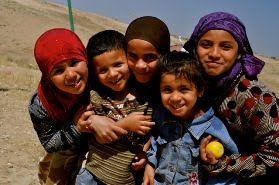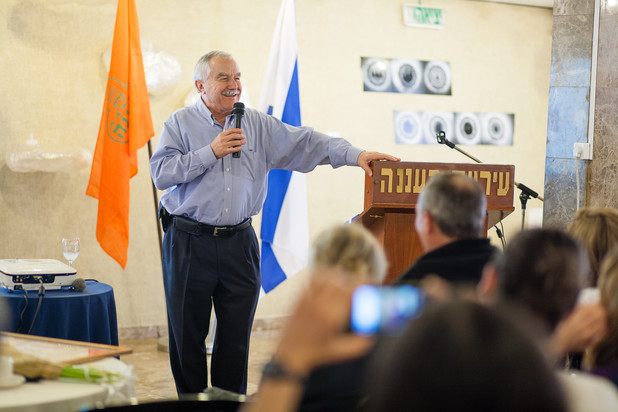Israel Exploring Ways to “Lower Birthrate” of Palestinian Bedouins

Photo: Natalie Becker
Israel is exploring ways to “lower the birthrate” of Palestinian Bedouins, its agriculture minister Yair Shamir has stated.
“We have to take all the Bedouin and get them out of the desert a bit and bring them closer to a normal state from the perspective of legislation, life expectancy, education and livelihood,” Shamir said, as reported by the Israeli daily Haaretz. “Perhaps we could even deal with the phenomenon of multiple wives to reduce the birthrate and raise the standard of living.”
According to the Association for Civil Rights in Israel, the Naqab (Negev) region of present-day Israel is home to an estimated 160,000 Palestinian Bedouins who carry Israeli citizenship. During a recent tour of the region, Shamir lamented that the Bedouin population would grow to half a million by 2035.
“Only a suicidal country doesn’t recognize the Bedouin problem,” Shamir said. “The blindness is terrible.”
Shamir is a member of the Yisrael Beiteinu (Israel Our Home) political party, founded by radical right-wing politician Avigdor Lieberman, Israel’s current foreign minister. The party is known for its notoriously anti-Palestinian members, such as David Rotem and Uzi Landau, both members of Israel’s parliament, the Knesset.
Racism with a smile: Yair Shamir regards the existence of indigenous people as a “problem.” (Gvahim)
Yair is also the son of former Israeli Prime Minister Yitzhak Shamir, a one-time member of the notorious Stern Gang (also known as Lehi), which violently attacked Palestinians and British colonial representatives during the British Mandate period (1920-1948).
The minister’s comments are “hardly even news in Israel,” explained Nadim Nashif, director of Baladna, a Haifa-based group campaigning for the rights of Palestinians in Israel.
“Astonishing”
“Obviously this is part of a broad pattern of incitement by Israelis, but sometimes it’s astonishing how racist politicians and ministers are,” Nashif told The Electronic Intifada. “In any country around the world, this would be compared to fascism, but in Israel it’s just daily news and not considered important.”
It is not the first time Israel has experimented in population control, either. In January 2013, Israel admitted that Jewish Ethiopian immigrants were being given long-acting contraceptives without their knowledge in order to decrease the community’s birthrate.
Bedouins in the Naqab are part of the estimated 1.7 million Palestinians who carry Israeli citizenship and live in cities, towns and villages across the country. According to the Haifa-based Adalah Legal Center, they suffer from dozens of discriminatory laws that muzzle their political expression and limit their access to state resources, most importantly land.
Israeli politicians have a long history of using racist and dehumanizing language when speaking about Bedouins, particularly during attempts to justify plans to forcibly relocate large parts of the indigenous population in the Naqab region.
Continued demolitions
“For years Israeli politicians have been talking about controlling Bedouin in certain geographical areas,” Nashif added. “We shouldn’t be surprised — the next step is controlling their birthrates, according to their logic.”
The Association for Civil Rights in Israel also estimates that some 80,000 Bedouins live in “unrecognized villages” in the Naqab, where they are denied access to state resources, including electricity, water, education and healthcare.
Though many of these communities predate the 1948 Nakba — the ethnic cleansing of Palestine and establishment of Israel — authorities have attempted to forcibly relocate them time and again.
The Prawer Plan, which aimed to relocate tens of thousands of Palestinian Bedouins into ghetto-like communities, was cancelled last December after sparking widespread outrage and protests among Palestinian communities in Israel and the occupied West Bank.
Yet, as recently reported by The Electronic Intifada, Israeli authorities have continued without pause to demolish homes in Bedouin communities across the Naqab.
Impunity
During Israel’s latest massacre of Palestinians in the besieged Gaza Strip — which lasted 50 days and killed more than 2,100 Palestinians, mostly civilians — anti-Palestinian incitement skyrocketed.
Among the politicians calling for increased violence was Knesset member Ayelet Shaked of the Habeyit Hayehudi (Jewish Home) party, who published on Facebook an article she accredited to the late settler leader Uri Elitzur.
Elitzur’s article labels “the entire Palestinian people [as] the enemy,” and calls for its destruction “including its elderly and its women, its cities and its villages, its property and its infrastructure.”
The article “is as relevant today as it was at the time,” Shaked wrote in a “status,” which received thousands of “likes” and was shared widely among Israeli Facebook users.
During the assault on Gaza, Moshe Feiglin, deputy speaker of Israel’s Knesset, called for Israel to “concentrate” and “exterminate” Palestinians in the Gaza Strip.
Writing on Facebook on 1 August, Feiglin said Israel should embark on the “conquest of the entire Gaza Strip, and the annihilation of all fighting forces and their supporters.”
In late August, the High Follow-Up Committee for Arab Citizens, a group that represents Palestinians in Israel, called for “immediate and effective legal action against the wave of violence, incitement, discrimination and racism targeted against the Palestinian Arab minority in Israel.”
Yet like Israeli soldiers and civilians who carry out violent attacks, politicians enjoy systematic impunity when their racist incitement is aimed at Palestinians.


